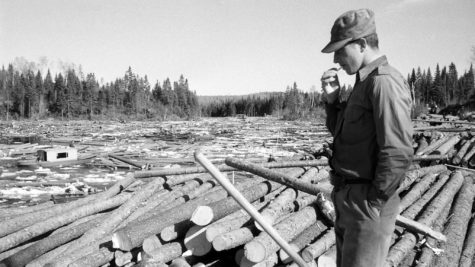 I spent this Labour Day weekend at a hunting and fishing club of which my father is a member. The Dumoine River Rod and Gun Club was celebrating its 100th anniversary, and forty-or-so members and relatives careened their way up the hills and dales of the old road to the club lodge for the gathering. Most of the members come to the club and stay just with their families, or in small groups, enjoying trout season, or grouse season, or the moose hunt in November. This time, they were there for each other.
I spent this Labour Day weekend at a hunting and fishing club of which my father is a member. The Dumoine River Rod and Gun Club was celebrating its 100th anniversary, and forty-or-so members and relatives careened their way up the hills and dales of the old road to the club lodge for the gathering. Most of the members come to the club and stay just with their families, or in small groups, enjoying trout season, or grouse season, or the moose hunt in November. This time, they were there for each other.
The club is in Quebec, but the majority of its members are American, and this has always been true. It was founded by Lake Placid businessmen; a photo of one early club meeting shows a black tie affair in a New York ballroom. Over time, some of the staff from the Chalk River nuclear laboratory just across the way in Ontario took an interest, and they make up some of the mix in members today. Dad joined when he wandered into a canoe trade show to get out of the rain and came upon the club’s display table.
The main two-storey lodge was first a farm depot built by the Hawkesbury Lumber Company around 1850.The logs would be floated down the Dumoine River to make their way toward the E.B. Eddy pulp and paper mill in Ottawa. The remains of a log chute have recently subsided back into the waters nearby, and you wouldn’t know from the look of the area that it used to be much busier than it is now. Next, it was the Sauvé stopping place, and if I overheard correctly, that was the location of the Saturday night dance, and the domain of the “Saturday night girls”, so there may have been some brothel-like qualities to the lodge.
As a hunting and fishing club, it oversees and stocks a vast area with dozens of lakes, and a number of smaller cabins are dotted around the property. It maintains a popular campsite for paddlers coming down the Dumoine River, and it works with the local snowmobile club and others to maintain the roads and bridges. Besides being a lovely spot, it would have held the appeal of being exempt from the Prohibition laws that were descending on New York at the time of the club’s founding. But it’s still standing, and Dad is hard at work on a solar system to cut down its propane use. There’s a young new caretaker who is bringing a lot of life to the place, and there’s a chance the club will see another celebration for its 200th anniversary in the year 2118.
The festivities of the weekend included a bass fishing derby, which was happily won by a child. There was a pig roast and an AGM for the club members. After dark one night, when the assembled party was in high spirits, there was held a moose calling competition. One after the other, the men stumbled behind the marquee tent that had been erected for the occasion and made ridiculous noises into the birch bark moose call. Hilarity ensued.
Then a member in his mid-90s was pressed into participating—one who had a wealth of moose hunting experience. He gave the male and the female calls, for perhaps the last time, and I couldn’t stand the jollity anymore.
The next day the same man stood and made the case for moose hunting, after one of the crowd said it was like shooting the side of a car. Having been in the Canadian air force during the Second World War, he was no stranger to adrenaline, but he described the heart-thumping thrill of luring a moose during mating season, using nothing but your voice. Hearing the bull crashing through the woods. Not knowing where it was or whether it would catch wind of you. Hoping—and also somehow dreading—that it would appear. Standing stock still with every sense heightened, for long minutes. Comparing memories later with your fellow hunters. It wasn’t about the shooting at all, he said. It was about feeling alive.
Image: National Film Board of Canada